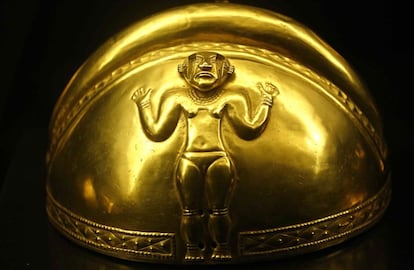Colombia rejects asking Spain to return donation of ancient gold pieces
Constitutional Court to decide whether or not gift made by president in 1890s was legal

Colombia’s Constitutional Court will decide in the coming months whether the government should be forced to ask Spain to return 122 ancient gold pieces donated to the Spanish monarchy in 1892 by a Colombian president.
The court has heard arguments from lawyer Felipe Rincón, who for the past 10 years has been fighting a legal battle for Spain to return the gold.
The pre-Columbian treasure came from the Quimbaya civilization, which is noted for its intricate gold pieces. The collection is on display at the Museum of the Americas in Madrid.
Colombian President Carlos Holguín (1888-1892) donated the pieces to Maria Christina of Austria, who was then Spanish queen-regent, in 1892.
Colombian Deputy Foreign Minister Patti Londoño Jaramillo has said that the donation was legal under the country’s laws at the time and that a court ruling would not be able to force Spain to return the treasure.
“Any unilateral action taken by a Colombian head of state in 1892 was an official act on behalf of the country”
“It must be noted that any unilateral action taken by a Colombian head of state [at that time] was an official act on behalf of the Republic of Colombia,” she said. “It was a legitimate transaction that was protected by the laws.”
Cristina Pardo, of the Colombian president’s legal office, has also said that the donation was legal even though many do not consider it so because it was never approved by Congress.
“There is no mechanism that would permit Colombia to force Spain to hand over the collection,” said Londoño Jaramillo, who added that current conventions and treaties addressing ownership of national treasures are not retroactive.
“The UNESCO convention went into effect in 1988, which makes it impossible to apply it to a donation that was made in 1892,” she explained.
In his arguments before the court, Rincón said that President Holguín purchased the Quimbaya collection with public money so that it could be displayed in Madrid as part of the events to celebrate the 400th anniversary of the discovery of America.
A year later, Holguín gave it to the queen-regent in gratitude for Spain’s arbitration in a border dispute between Colombia and Venezuela.
Rincón has the support of Colombia’s solicitor general and ombudsman, who were also present during the court hearing. Both public officials argued that the treasure is part of Colombia’s national heritage and must be returned.
Also defending the recovery of the treasure are members of Colombia’s indigenous communities and various NGOs
“There is no doubt that recovering the Quimbaya treasure would represent an act of cultural sovereignty that future generations will appreciate”
Fernando Vicario, a Spaniard who is director of culture for the Organization of Ibero-American States (OEI), said returning the treasure would be a major accomplishment in “preserving Ibero-American culture in a world where symbolic items should be considered more important than bureaucratic and legislative issues.”
Ricardo Sánchez, dean of humanities at Colombia’s National University, also sided with Rincón’s argument that Holguín never asked Congress for permission to give the collection to the queen-regent.
“I have the honor of announcing that today I have given her majesty, the queen-regent, gold pieces that are part of the fine collection of Quimbaya antiquities sent by the government as a gift to Spain,” President Holguín said at the time.
Many have interpreted his words as meaning that the donation was made without any type of government consultation.
Enrique Gaviria Liévano, former Colombian ambassador to the United Nations and an expert on international issues, asked the court to find a way for the Quimbaya collection to be returned.
One legal remedy, according to Gaviria Liévano, would be to allow the Colombian government to negotiate directly with the Museum of the Americas in Madrid.
“There is no doubt that recovering the Quimbaya treasure would represent an act of cultural sovereignty that future generations will appreciate,” he wrote in a column for the daily El Tiempo.
English version by Martin Delfín.
Tu suscripción se está usando en otro dispositivo
¿Quieres añadir otro usuario a tu suscripción?
Si continúas leyendo en este dispositivo, no se podrá leer en el otro.
FlechaTu suscripción se está usando en otro dispositivo y solo puedes acceder a EL PAÍS desde un dispositivo a la vez.
Si quieres compartir tu cuenta, cambia tu suscripción a la modalidad Premium, así podrás añadir otro usuario. Cada uno accederá con su propia cuenta de email, lo que os permitirá personalizar vuestra experiencia en EL PAÍS.
¿Tienes una suscripción de empresa? Accede aquí para contratar más cuentas.
En el caso de no saber quién está usando tu cuenta, te recomendamos cambiar tu contraseña aquí.
Si decides continuar compartiendo tu cuenta, este mensaje se mostrará en tu dispositivo y en el de la otra persona que está usando tu cuenta de forma indefinida, afectando a tu experiencia de lectura. Puedes consultar aquí los términos y condiciones de la suscripción digital.









































